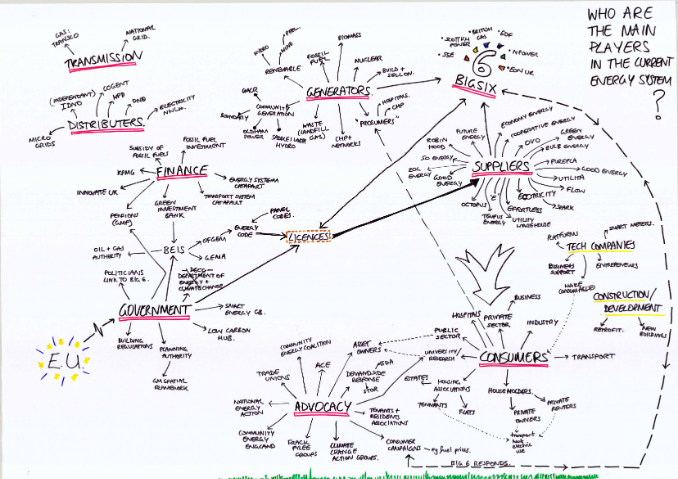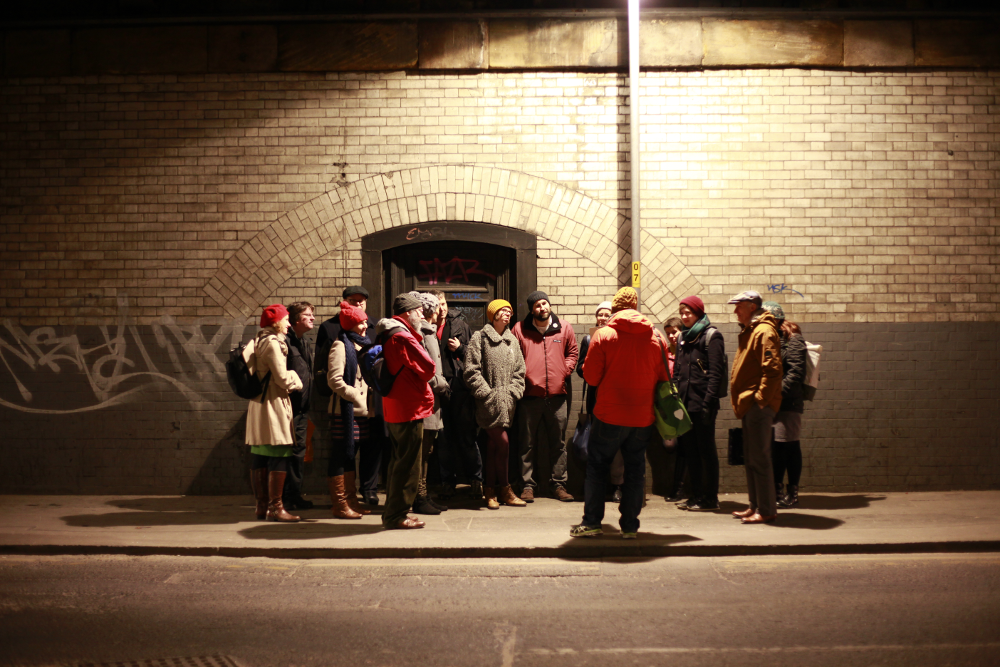Together we created our own vision for a municipal energy company as laid out in the Energy Futures prospectus, which we launched at the Mayor of Manchester’s Green Summit in March of 2018. It was announced at the Summit that the Greater Manchester Combined Authority (GMCA) would be looking into establishing some kind of energy company for the region. A year on, we are still waiting for the full plan. Once it emerges however we’ll be ready to analyse whether or not it lives up to our demand that democracy, clean energy and fair treatment be embedded into the company’s core.
Background
‘Big Six’ energy company price hikes, increasing numbers of people forced into energy poverty, market incumbents resisting change and the collapse of Carillion, the UK’s second-largest construction company, have all demonstrated the illusion of private sector efficiency and market primacy in the energy system. In fact, the system is broken beyond reform and in need a serious rethink.
There is clearly appetite for change; for example a recent YouGov poll showed that the majority of the public believes that energy provision should be taken back into public hands. At the same time, some activists question whether a nationalised, top-down market model suits a rapidly changing system. They highlight the opportunity to reimagine localised, decentralised public energy ownership, for example with citizens running renewable energy projects and establishing the new localised grid services.
The increased interest in energy devolution among Greater Manchester activists provided the ideal opportunity for us to think about what kind of local energy system we want. This is where Energy Democracy Greater Manchester entered the scene. Inspired by the campaigns in Berlin and London for municipal energy companies, our group wanted to see whether the idea of a company that gives citizens and workers decision-making control, provides clean energy and treats its customers and workers fairly resonated with Greater Manchester citizens.
We began with a series of public workshops where we shared case studies of two similar campaign initiatives, Berlin Energietisch and Switched On London. We showed the impact that campaigns like these have achieved, and discussed whether people felt that a similar campaign in Greater Manchester could work. The attendees of the workshop, including Greater Manchester Poverty Action, Stop TTIP MCR, Carbon Co-op and Friends of the Earth, were keen to explore whether the interest felt in the room was also shared by the rest of Greater Manchester’s citizens. We followed this question up by running our own survey to test attitudes towards some of the key demands in Switched On London’s campaign, and worked with the local district network operator Electricity North West to run a YouGov poll to ascertain the general public’s attitude towards introducing greater democratic mechanisms into local energy provision. Both initiatives demonstrated a local appetite for change and interest in new democratic mechanisms, with 65% of poll respondents agreeing that customers should have a place on the boards of energy companies.
In the meantime, however, the local political appetite for establishing an energy company was waning. The Greater Manchester Combined Authority had commissioned a private company to review whether or not they should establish their own energy company, following the lead of initiatives like the Nottingham City Council’s ‘Robin Hood’. The analysis concluded that establishing such a company would be too risky for Greater Manchester. In particular, there was concern about whether it would be possible to attract enough customers to purchase from the proposed municipally-owned energy company.
We felt that this analysis didn’t do justice to the strength of feeling that we had experienced in our community engagement work. We decided to prove the interest of citizens by handing the discussion over to them: allowing people to collaboratively discuss the current energy system, research alternatives and imagine a new energy future. We worked with the University of Sheffield’s Jam and Justice research project to fund a new initiative – the People’s Republic of Energy – that brings together a diverse group of stakeholders including climate activists, council officers, energy practitioners, politicians, trade unionists, researchers, co-operative practitioners and policy wonks to co-research and re-design energy provision in Greater Manchester. From the start, the group was particularly interested in the role of workers and citizens’ participation in decision making, as well as how to address societal issues such as fuel poverty and climate change. Our aim was to put forward a proposal for municipal-level energy solutions at the Green Summit organized by Greater Manchester Mayor Andy Burnham in the spring of 2018.
Facilitating a process for participants to effectively share their knowledge, expertise and viewpoints was key to the project’s success. As facilitators, we tried hard to create a space where co-researchers could trust in one another, openly share their ideas, learn, and collectively devise innovative solutions. We employed a facilitator with a background in socially engaged art, and used creative engagement tools to encourage collaboration. The group mapped the current energy system (see image 1), visited the head office of the local distribution network operator, took part in an immersive theatrical walk covering the history of Manchester’s energy system and developed case studies on innovative international energy transition projects.

Energy system mapping exercise created through a facilitated conversation with workshop participants. Visual notes were taken to capture the discussion.
The case studies covering the open forum Paris Water Observatory, in which citizens have a space for oversight and information, and the local government and energy co-operative integrated municipal energy model in Wolfhagen, Germany were particularly useful. These examples helped group members to broaden their understanding and form a collective view on what should be proposed for Manchester. Together these methods offered an alternative to traditional meeting formats, which tend to benefit particular character types and follow familiar patterns, and enabled the emergence of new voices. This was particularly true in terms of gender balance. The majority of the participants (56%) identified as female, which made a noticeable difference in the tone and quality of the discussion and allowed more creative and innovative ideas to come to the fore.
The project learnings were captured in the Energy Futures prospectus, which imagines a future Greater Manchester municipal energy company over the next five, 10 and 20 years. We posited that the company would act as a vehicle through which energy partnerships and infrastructure projects could be initiated in order to radically change the urban region’s energy system. There would be a municipally-owned electric vehicle charging scheme; renewable generation installations in partnership with community energy groups; a single, fair energy tariff available to all customers; and a ‘comfy homes’ energy scheme investing in improving leaky, cold houses.
Our vision doesn’t stop with a traditional energy company run by local authorities. To us, citizen ownership and control is important in avoiding decision making that is unaccountable and unresponsive to changing public needs. We feel that any municipal energy project needs to incorporate clear channels for citizen input in decision making that goes beyond mere consultation. Inspired by the model used in the municipalisation of the water services company in Paris, we believe that the first step would be to establish an ‘infrastructure observatory’ enabling any Greater Manchester citizen to engage with strategic plans, make decisions around future projects and participate in board elections. Otherwise, we risk alienating those actually using the energy services.
As planned, the prospectus was launched at the Green Summit in March of 2018. A key success of the gathering (and great news for our project) was the announcement of the establishment of a municipal energy company. Since the Summit, the GMCA has chosen to award the development of this company to a private company that has little on-the-ground engagement with Greater Manchester citizens. Public participation may therefore be sidelined, despite the fact that dialogue could have continued through the project’s process.
Since then, the GMCA has announced that it will be establishing a Co-operative Coalition to ensure that Greater Manchester stays at the forefront of co-operative development. The provision of energy services offers the perfect opportunity to explore what this could practically look like. The People’s Republic of Energy project has created a network of individuals ready to participate in this debate. All that is needed now is the space to continue a genuine, collaborative discussion. We now await the GMCA’s final paper on the energy company, hoping that it lives up to our demands that democracy, clean energy and fair treatment be embedded into the core of the company.
Resources
Energy Democracy Greater Manchester
Carbon co-op
GM Energy Futures prospectus
